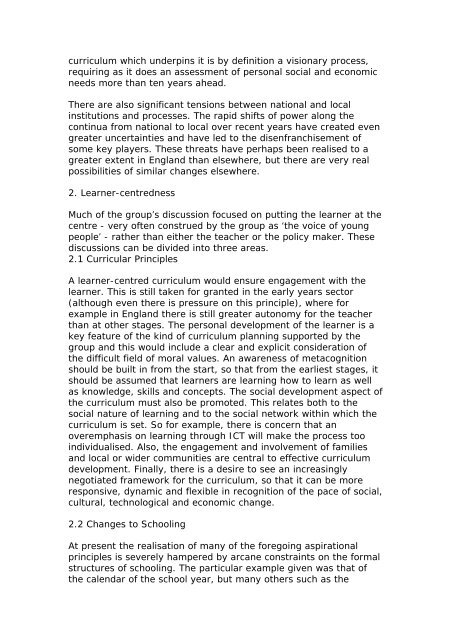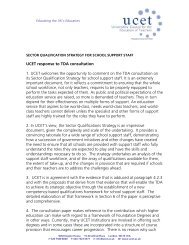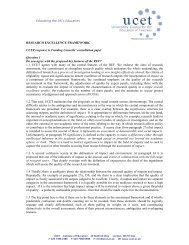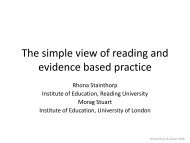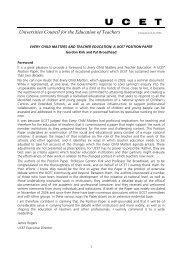The School Curriculum Ten Years Hence - UCET: Universities ...
The School Curriculum Ten Years Hence - UCET: Universities ...
The School Curriculum Ten Years Hence - UCET: Universities ...
You also want an ePaper? Increase the reach of your titles
YUMPU automatically turns print PDFs into web optimized ePapers that Google loves.
curriculum which underpins it is by definition a visionary process,<br />
requiring as it does an assessment of personal social and economic<br />
needs more than ten years ahead.<br />
<strong>The</strong>re are also significant tensions between national and local<br />
institutions and processes. <strong>The</strong> rapid shifts of power along the<br />
continua from national to local over recent years have created even<br />
greater uncertainties and have led to the disenfranchisement of<br />
some key players. <strong>The</strong>se threats have perhaps been realised to a<br />
greater extent in England than elsewhere, but there are very real<br />
possibilities of similar changes elsewhere.<br />
2. Learner-centredness<br />
Much of the group’s discussion focused on putting the learner at the<br />
centre - very often construed by the group as ‘the voice of young<br />
people’ - rather than either the teacher or the policy maker. <strong>The</strong>se<br />
discussions can be divided into three areas.<br />
2.1 Curricular Principles<br />
A learner-centred curriculum would ensure engagement with the<br />
learner. This is still taken for granted in the early years sector<br />
(although even there is pressure on this principle), where for<br />
example in England there is still greater autonomy for the teacher<br />
than at other stages. <strong>The</strong> personal development of the learner is a<br />
key feature of the kind of curriculum planning supported by the<br />
group and this would include a clear and explicit consideration of<br />
the difficult field of moral values. An awareness of metacognition<br />
should be built in from the start, so that from the earliest stages, it<br />
should be assumed that learners are learning how to learn as well<br />
as knowledge, skills and concepts. <strong>The</strong> social development aspect of<br />
the curriculum must also be promoted. This relates both to the<br />
social nature of learning and to the social network within which the<br />
curriculum is set. So for example, there is concern that an<br />
overemphasis on learning through ICT will make the process too<br />
individualised. Also, the engagement and involvement of families<br />
and local or wider communities are central to effective curriculum<br />
development. Finally, there is a desire to see an increasingly<br />
negotiated framework for the curriculum, so that it can be more<br />
responsive, dynamic and flexible in recognition of the pace of social,<br />
cultural, technological and economic change.<br />
2.2 Changes to <strong>School</strong>ing<br />
At present the realisation of many of the foregoing aspirational<br />
principles is severely hampered by arcane constraints on the formal<br />
structures of schooling. <strong>The</strong> particular example given was that of<br />
the calendar of the school year, but many others such as the


